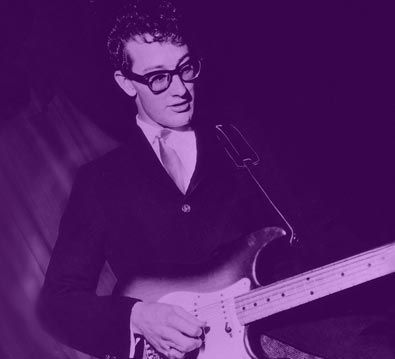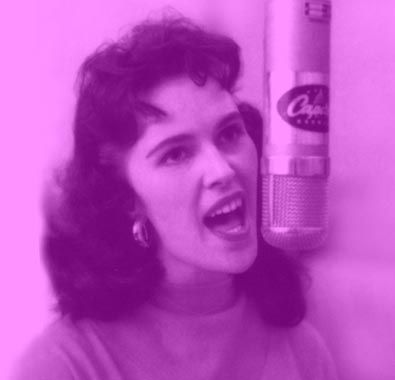...with massive Music Player!
16 hours of international Rock'n'Roll music, in order from 1947 to 1960!*
This is a Spotify player. Join up for free here.
*(The Player is limited to the first 200 songs.
Hear the unlimited double-length Playlist here.)
RockSex now brings you the actual, all-inclusive history of Rock'n'Soul music each week.
Let's start with the Big Bang itself, 1950's Rock'n'Roll.
History Checklist
![]()
The Revolution of 1950's Pop
Until 1955, radio belonged to the adults in America.
The pop charts were mainly somnolent syrup lulling war-weary elders into a saccharine trance. Music was the loll of reassurance and restraint. But small record labels, jukeboxes, and night owl radio waves changed that. The youth heard crazy voices whispering from this alien ether and acted on them. Overnight the word 'Pop' became a whole new universe, a joyful free-for-all, where everything combined and recombined in endless new shapes. What had been became everything that would be, blendered in the restless energy of the young.
What were the seeds of this cultural revolution?
![]()
Sax and electric guitar were a new jolt to Jazz in the decade before, leaping in and carousing like a drunk crasher. Their raunchy edge whipped the crowds crazy into communal spasms like the modern age had never seen. Swing Jazz orchestras pumped the war years up with brassy horn sections and liquid crystalline guitar. But war shortages pared the big bands down to quartet combos, easier to fit in a car and feed. In the late 40's these trimmed-back troubadours pounded out Jump Jive and Boogie Woogie to kids from coast to coast. The primal pulse was that Boogie. It shook hips without shame from juke joints to hoedowns nationwide. To this raw rhythm was added the refined sound of electric guitar. Les Paul and his cohort Mary Ford reeled off lightning licks so complex, mercurial, and high-pitched they sounded like they were chiming in from another world. And every kid with a twanger for thirty years would take notice.
![]()
Gutbucket Blues framed the skeleton of Rock. That wrestle with the Devil, with conscience, with life, all with laughing abandon. And that hard clang, that terse swagger, that moody intonation. Blues was the edge, the
truth. It infects blazers like Big Mama Thornton's "Hound Dog", LaVern Baker's "Jim Dandy", and Chuck Berry's "Reelin & Rockin" with its ambivilent zest.
![]()
Country hit a hard-twanging gallup in the early 50's with Honky Tonk music. While many blues masters scowled terse chords, hillbilly sages barnstormed the hayrides with blue streak riffs honed out of Bluegrass. It was the heady mix of blues fuel with country wildfire that ignited Rockabilly. Country riffs are rife throughout songs like Chuck Berry's "Too Much Monkey Business", Joe Clay's "Duck Tail", Carl Perkins'"Put Your Cat Clothes On", Ricky Nelson's "Believe What You Say", Little Jimmy Dickens'"I Got a Hole In My Pocket", and the hypersonic string wizardry of Joe Maphis and his 13-year-old accomplice, Larry Collins.
But Rock'n'Roll was no chess game, no black and white, not just Country and Blues.
It's a shock, I know, but listen up. Or rather, just listen to those records again, and look closer at the people making them. Like all actual culture, it was a jigsaw puzzle. Simultaneously it was splicing strings from Classical, slide from Hawaii, syncopation from Cuban Jazz, two-step from Tex-Mex, eerieness from Electronic music, and folk strains from all immigrant cultures.
Culture isn't constant or owned by a pure group. Culture is constantly renewing itself through everyone.
It is an intersection of ideas. We refract everything we've taken in. From each other, with each other, for each other.
![]()
Country kids (such as my Dad) hid radios under their pillows to taste all of the flavors of the world beyond and then became radio beacons made flesh. Soundwaves bypass all boundaries, whether on maps, in cultures, or in one's head.
![]()
Kindergarten activists who knock Elvis for singing a Blues song miss the point; he also sang Bluegrass, Pop, and Gospel songs in the same breath, and channeled them without the barriers. He made further music out of the music that he lived and breathed. Using a separatist model of colonialism on him would be ludicrous and oversimplified. Similarly, but unnoted, Chuck and Bo made their breakthroughs based on Country songs simultaneously.
![]()
Elvis, like his generation, was the fruition of tearing down all separations. Rather than a King, he was part of a pantheon of young men and women rethinking the future. There was no ruler because there were no more rules. Everyone was king and queen, if only for a performance, a 45, a school dance, a love affair, a night ride, a new idea shared.
![]()
The 40's Jump Jive music and Jitterbug dances unleashed the shared Rock revolution.
The 50's was a smorgasbord, with sooo many flavors to choose from. Fats Domino tickling Crescent City piano rolls. The Big Bopper possessed by Jump Jive. The Five Satins converting Gospel chorals into soaring teen lust. Little Richard roaring out barrelhouse Blues past the speed of tongue. The Coasters trajecting the Marx Brothers through Rhythm and Blues. The Drifters wafting over epic string sections. Ronnie Self sneering wanton through Honky Tonk. The mighty Howlin' Wolf gargling gravel and electric Blues. The Everly Brothers countrifying the celtic hymn tradition. Santo & Johnny and the Ventures sailing out into the first ripples of Surf to come, with Mediterranean, Hasidic, and other worldly melodies churning beneath.
![]()
And the personalities. The smooth spacefaring glee of Mary Ford. The smoldering satisfaction of Ruth Brown. The cocksure Bo Diddley. The ethereal Platters, wings to the archangel Tony Williams. Lascivious Presley. The ever charming Carl Perkins. That hellion Wanda Jackson, so fair and fierce. The riotous theatrics of the Coasters and Don & Dewey. The eerie dreamscape of the Flamingos. The intense urgency of the seeming everyman Buddy Holly. The startling virtuosity of Jackie Wilson's performance of "Lonely Teardrops". And sweet Gene Vincent, blasting headlong and hardscrabble.
![]()
These voices gave voice to all the un-adults, to their dreams, pains, schemes, and refrains. It lit the secret night like a clarion call only they could hear and act upon. It understood the addled essence of adolescence, the comedy of errors that was their lot. It promised them a world without constriction where anything could happen, if they took up the call...
In 1955, the future belonged to the young.
© Tym Stevens
See also:
The Real History of Rock and Soul!: A Manifesto, A Handy Checklist
16 hours of international Rock'n'Roll music, in order from 1947 to 1960!*
Hear the unlimited double-length Playlist here.)
RockSex now brings you the actual, all-inclusive history of Rock'n'Soul music each week.
Let's start with the Big Bang itself, 1950's Rock'n'Roll.
History Checklist
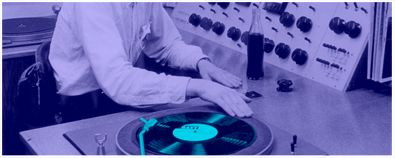
The Revolution of 1950's Pop
Until 1955, radio belonged to the adults in America.
The pop charts were mainly somnolent syrup lulling war-weary elders into a saccharine trance. Music was the loll of reassurance and restraint. But small record labels, jukeboxes, and night owl radio waves changed that. The youth heard crazy voices whispering from this alien ether and acted on them. Overnight the word 'Pop' became a whole new universe, a joyful free-for-all, where everything combined and recombined in endless new shapes. What had been became everything that would be, blendered in the restless energy of the young.
What were the seeds of this cultural revolution?

Sax and electric guitar were a new jolt to Jazz in the decade before, leaping in and carousing like a drunk crasher. Their raunchy edge whipped the crowds crazy into communal spasms like the modern age had never seen. Swing Jazz orchestras pumped the war years up with brassy horn sections and liquid crystalline guitar. But war shortages pared the big bands down to quartet combos, easier to fit in a car and feed. In the late 40's these trimmed-back troubadours pounded out Jump Jive and Boogie Woogie to kids from coast to coast. The primal pulse was that Boogie. It shook hips without shame from juke joints to hoedowns nationwide. To this raw rhythm was added the refined sound of electric guitar. Les Paul and his cohort Mary Ford reeled off lightning licks so complex, mercurial, and high-pitched they sounded like they were chiming in from another world. And every kid with a twanger for thirty years would take notice.
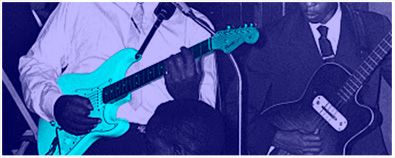
Gutbucket Blues framed the skeleton of Rock. That wrestle with the Devil, with conscience, with life, all with laughing abandon. And that hard clang, that terse swagger, that moody intonation. Blues was the edge, the
truth. It infects blazers like Big Mama Thornton's "Hound Dog", LaVern Baker's "Jim Dandy", and Chuck Berry's "Reelin & Rockin" with its ambivilent zest.
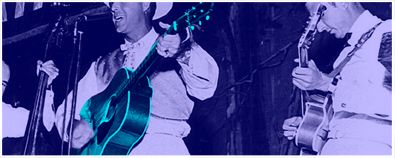
Country hit a hard-twanging gallup in the early 50's with Honky Tonk music. While many blues masters scowled terse chords, hillbilly sages barnstormed the hayrides with blue streak riffs honed out of Bluegrass. It was the heady mix of blues fuel with country wildfire that ignited Rockabilly. Country riffs are rife throughout songs like Chuck Berry's "Too Much Monkey Business", Joe Clay's "Duck Tail", Carl Perkins'"Put Your Cat Clothes On", Ricky Nelson's "Believe What You Say", Little Jimmy Dickens'"I Got a Hole In My Pocket", and the hypersonic string wizardry of Joe Maphis and his 13-year-old accomplice, Larry Collins.
But Rock'n'Roll was no chess game, no black and white, not just Country and Blues.
It's a shock, I know, but listen up. Or rather, just listen to those records again, and look closer at the people making them. Like all actual culture, it was a jigsaw puzzle. Simultaneously it was splicing strings from Classical, slide from Hawaii, syncopation from Cuban Jazz, two-step from Tex-Mex, eerieness from Electronic music, and folk strains from all immigrant cultures.
Culture isn't constant or owned by a pure group. Culture is constantly renewing itself through everyone.
It is an intersection of ideas. We refract everything we've taken in. From each other, with each other, for each other.

Country kids (such as my Dad) hid radios under their pillows to taste all of the flavors of the world beyond and then became radio beacons made flesh. Soundwaves bypass all boundaries, whether on maps, in cultures, or in one's head.
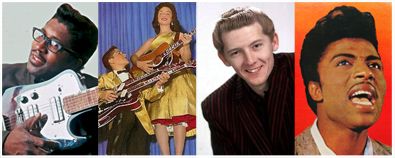
Kindergarten activists who knock Elvis for singing a Blues song miss the point; he also sang Bluegrass, Pop, and Gospel songs in the same breath, and channeled them without the barriers. He made further music out of the music that he lived and breathed. Using a separatist model of colonialism on him would be ludicrous and oversimplified. Similarly, but unnoted, Chuck and Bo made their breakthroughs based on Country songs simultaneously.
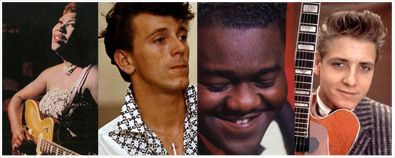
Elvis, like his generation, was the fruition of tearing down all separations. Rather than a King, he was part of a pantheon of young men and women rethinking the future. There was no ruler because there were no more rules. Everyone was king and queen, if only for a performance, a 45, a school dance, a love affair, a night ride, a new idea shared.
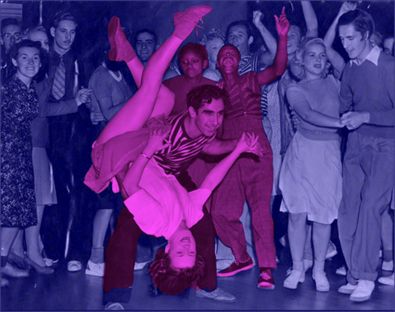
The 50's was a smorgasbord, with sooo many flavors to choose from. Fats Domino tickling Crescent City piano rolls. The Big Bopper possessed by Jump Jive. The Five Satins converting Gospel chorals into soaring teen lust. Little Richard roaring out barrelhouse Blues past the speed of tongue. The Coasters trajecting the Marx Brothers through Rhythm and Blues. The Drifters wafting over epic string sections. Ronnie Self sneering wanton through Honky Tonk. The mighty Howlin' Wolf gargling gravel and electric Blues. The Everly Brothers countrifying the celtic hymn tradition. Santo & Johnny and the Ventures sailing out into the first ripples of Surf to come, with Mediterranean, Hasidic, and other worldly melodies churning beneath.
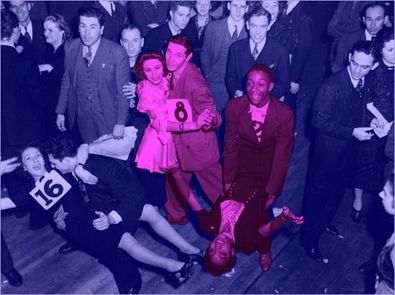
And the personalities. The smooth spacefaring glee of Mary Ford. The smoldering satisfaction of Ruth Brown. The cocksure Bo Diddley. The ethereal Platters, wings to the archangel Tony Williams. Lascivious Presley. The ever charming Carl Perkins. That hellion Wanda Jackson, so fair and fierce. The riotous theatrics of the Coasters and Don & Dewey. The eerie dreamscape of the Flamingos. The intense urgency of the seeming everyman Buddy Holly. The startling virtuosity of Jackie Wilson's performance of "Lonely Teardrops". And sweet Gene Vincent, blasting headlong and hardscrabble.
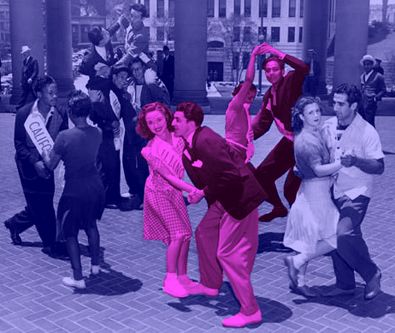
These voices gave voice to all the un-adults, to their dreams, pains, schemes, and refrains. It lit the secret night like a clarion call only they could hear and act upon. It understood the addled essence of adolescence, the comedy of errors that was their lot. It promised them a world without constriction where anything could happen, if they took up the call...
In 1955, the future belonged to the young.
© Tym Stevens
See also:
The Real History of Rock and Soul!: A Manifesto, A Handy Checklist
